It’s the wee hours of the morning and I am awake. I’m not refreshed; no, I’m exhausted. Too tired to do anything productive and unable to sleep, knowing that the day is going to be spent in a zombie-like fog. Sometime around 9 a.m., my brain is going to decide it’s ready to sleep. Unfortunately, life isn’t willing to juggle my schedule around just because I can’t sleep tonight.
I’ve never been what you would call a “good” sleeper. Waking up refreshed and feeling you’ve gotten enough sleep? I’m still pretty sure that’s a myth.
Sleeping with chronic illness? It’s rough.
Anxiety means that my brain buzzes with constant reminders. Most notably: Are you sure you set your alarm? I mean, like, really sure? You checked five minutes ago but what if you were wrong? Sure it’s an alarm you’ve set to automatically go off every day, which goes off every single friggin’ day, but what if today it glitches?
Fibromyalgia means I’m often in too much pain to sleep comfortably. Depression means that morning brings with it a feeling of dread and a desire to just hide under the blankets all day. Then, just to keep things interesting, sometimes insomnia gets added in. We wouldn’t want things to get predictable.
Here’s the thing about sleep: it’s how we heal and rejuvenate.
You probably know that, intellectually, but you don’t really understand it until you aren’t getting that. A good night’s sleep is what helps us get over colds, heal broken bones, soothe broken hearts and get clarity on a bad situation. Think about how often you’ve heard the advice to “sleep on it” or that “things will look better in the morning.” That’s the power of sleep!
Sleeping with chronic illness and children? I think you mean “not sleeping.”
Middle of the night wake-ups aren’t fun for anyone, and it gets even worse when there’s a possibility it means you just won’t get back to sleep, period. Or when you spend hours tossing and turning, finally start to fall asleep, only to be woken up by someone crying for you. It also means having an alarm clock that won’t be snoozed — kids who need breakfast aren’t known for their patience.
See, I kind of lied earlier. I used to be able to juggle my schedule a bit to work around my chronic illness. I started my own business 10 years ago, in part so I could set my own schedule and work around my health.
It isn’t that life isn’t willing to shift just because I have a chronic illness: it’s that my kids don’t just stop being kids. They don’t stop needing to be taken to activities and held when they fall and cared for and loved. They don’t stop waking up at the crack of dawn even though I couldn’t fall asleep until five minutes earlier.
My partner is a star and pulls more than the fair share of weight, which helps, but it isn’t easy.
Sleep with a chronic illness means pretty much always being some level of cranky and tired.
Sleep with a chronic illness means wanting desperately to do more and just not having the energy.
Sleep with a chronic illness means saying “no” to activities you really want to do because you’d basically snore through them.
Sleep with a chronic illness means flu and brain fog last even longer than they normally would.
Sleep with a chronic illness means carefully scheduling things to make sure you give yourself time to recover if you’ve had a bad night.
I feel like I should end this on something empowering. Something about overcoming all obstacles, some helpful advice. Because you aren’t supposed to let yourself feel bad for too long, right? You’re supposed to be strong no matter what. That’s the person I want to be.
Most of the time, I’m able to be that person.
Today, though? I’m exhausted and I just want to write about how, sometimes, things are really hard. Sometimes you don’t get enough sleep for too many days in a row and you just need to cry for a little while. Because, sometimes that’s the person I am. And that’s OK, too.
Photo by Katya Khromova on Reshot

